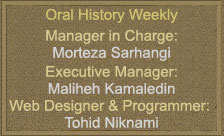| No. 265 | 21 August 2016 |
Imam Musa al-Sadr from perspective of "Agreed Followers"Oral history and loyalty to tune and literature of narratorHe did not like anyone dictate people. This behavior was for his athletic attitude. He cooperated with party "Devotees of Islam" martyr Navab Safavi, and for the sake of friendship with the heroes of Tehran, whenever he message them for problems related to Ayatollah Kashani, each of them gathered a lot of people. Ayatollah Sayed Morteza Mostajabi has such a character. He wrote in his book" Agreed Followers" about his fragmented Memories, family of Sadr and Imam Musa al- Sadr. The book is set in the form of an interview and is one of the books in the form of oral history collection about Imam Musa al-Sadr that have been published by Cultural Research Institute.Torture, homesickness, resistance, and the feeling of freedom…Oral history of freed POWs and memoirs of captivity as narrated by four books16th of August every year is marked as a special day in the history of the eight-year Iraqi imposed war against Iran. On this day in 1990, the Iranian combatants who had been taken as captives came back to Iran. With hands free of arms but with hearts armed with faith and resistance, they preserved the privacy of their own defense even more than the war years. One way of respecting their resistance and remembering the sweet moments of freedom is to refer to their memoirs. The website of Iranian Oral History has reviewed four books about the account of freed POWs in order to commemorate that special day in 26 years ago.Overview of the 11th volume of “Closed Doors Era”When Seyyed Ali Akbar Abutorabi changed the lifestyle of captivesAugust 17, 1990; there was whirl in the border of Iran and Iraq; one of the first days of exchange of Iranian and Iraqi war captives. That day, one hostage who was freed from Iraqi camps and tasted freedom was a young man by the name of Gholam Abbass Mohammad Hassani. A young man with less than three decades of age who had spent eight years of his youth in prisons of Iraq as a hostage. When Gholam Abbass was taken he wasn’t even 20. Now, that young man is middle aged and is recounting his memories of his days as war hostage; memories that are compiled by the efforts of Seyyed Hossein Yahyavi and published by Ravayat Fath Publication.Memories of the War and Captive of Azizollah Farrokhi- Part IRadiotelephones were saying: Go to the moon!Azizollah Farrokhi, one of the combatants and freedmen of years of the war and during the Iraqi imposed war against Iran. He was born in Tehran in 1342, was interviewed with Iranian Oral History website about his memories of the war and also her captivity in army camps of Saddam. In the first part of this interview, we read Farrokhi memories of the first dispatch to the front until liberation of Khorramshahr. Oral History Weekly Magazine Aims and Regulations
Oral History Weekly Magazine wishes to create a suitable place for thoughts and idea development; Its main field would be “Oral History” and subjects as telling & writing memoirs, writing diaries, travelogues, chronologies, and all other subfields of history which are presented in the form of news, articles, reports, notes, interviews and memoirs can be included. There is no limitation on the length of would-be-sent materials. Mentioning the name, academic background and email is necessary. Articles with complete references and bibliography are more credited and an abstract would quite helpful. Weekly is not about to publish any material consisting insults and libels about other people or anything that brings anxiety to public opinion. Weekly can edit and translate the received materials. The published articles and materials are only the writer’s ideas and Oral History Weekly Magazine has no responsibility about their content. |
 Air Raid to Al-Waleed (33) The Story of Demolishing Fighters and the Equipment in Al-Waleed Triple Military Bases Known as H-3 By: Brigadier General Ahmad Mehrnia Tehran, Sooreh Mehr Publications Company 2010 (Persian Version) Translated by: Zahra Hosseinian
Returning of damaged aircraft Since repairing damaged aircraft was out of possibilities of present facilities, a strong mechanic team with required equipment and parts were sent to Syria by a Hercules aircraft (C-130) a few days after the end of operation. About four months technicians worked hard on damaged parts of aircraft, including fuselage, hydraulic system, and so on until this expensive flying was prepared. On 8th of August in the same year, two Hercules delivered the engine, related jack (stand) and other supplies to repairers, because the engine of aircraft was also damaged, and returned to Tehran two days later.    |
